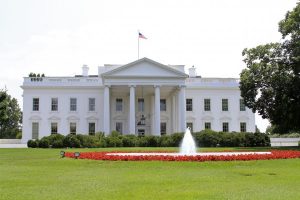Supporters of President Trump may not agree with this, but many Americans (and presumably others around the globe) would maintain that much of what Trump, other administration officials and many conservative lawmakers consistently use is doublespeak – “language used to deceive usually through concealment or misrepresentation of truth.” The term was originally associated with George Orwell’s dystopian novel, Nineteen Eighty-Four, even though it was not used specifically. Wikipedia expands on the basic definition this way:
Doublespeak may take the form of euphemisms (e.g., “downsizing” for layoffs, “servicing the target” for bombing), in which case it is primarily meant to make the truth sound more palatable. It may also refer to intentional ambiguity in language or to actual inversions of meaning. In such cases, doublespeak disguises the nature of the truth. Doublespeak is most closely associated with political language.
Many journalists in the mainstream media and some public servants have pointed out the many examples showing Trump to be a pathological liar (Sen. Bernie Sanders, the Sun-Sentinel and others). I dealt with this briefly not long ago, but here I will explore more specifically how doublespeak relates to Trump’s claims to bring America back to “greatness,” many of which dovetail with longstanding conservative and Republican beliefs.
- Tax reform. “Tax reform” language from the White House and conservatives is almost always doublespeak. The term “reform” itself normally suggests progress and improvement; the Cambridge English Dictionary defines reform “to make an improvement, especially by changing a person’s behaviour or the structure of something.” Whose taxes exactly would be improved by the so-called “reform” contained in the one-page, bullet-pointed document recently released by the White House and designated “tax reform”? Analyses by others describe it, conversely, as “outrageously fiscally irresponsible,” “unfair,” and helping wealthy taxpayers “make out like bandits.”

- Failure as success. Trump frequently promotes his failures (as evidenced by facts) as successes. In a recent article in Politico, author Michael Kruse not only analyzed Trump’s first 100 days in office but also his entire business career: “He flopped as an owner of a professional football team, effectively killing not only his own franchise but the league as a whole.… He bankrupted his casinos five times over the course of nearly 20 years. His eponymous airline existed for less than three years and ended up almost a quarter of a billion dollars in debt. And he has slapped his surname on a practically never-ending sequence of duds and scams (Trump Ice bottled water, Trump Vodka, Trump Steaks, Trump magazine … Trump University—for which he settled a class-action fraud lawsuit earlier this year for $25 million). Other risk-taking businessmen might periodically cop to falling short while pivoting to what’s next. Not Trump. He has dealt with his roster of losses largely by refusing to acknowledge them as anything other than wins.” (Kruse provides specifics in his article.)
- Makers and takers. Conservatives rail against the so-called “takers” in our society – those who are on Medicaid, food stamps, welfare and other government assistance programs. Conservatives argue that these Americans are not “making” goods that contribute to society but are rather “taking” from the rest of us who work hard. The question needs to be asked, however, what exactly the very wealthy – the supposed “makers” – are “making” on behalf of our society (besides money for themselves). While many top CEOs work long hours at their jobs, “for those [people] making $10 million or more, salaries and wages only account for around 15 percent of their income. Their real money comes from capital gains, with capital gains accounting for about half of their earnings. Another 15 percent to 20 percent came from interest and dividends,” according to a 2012 CNBC analysis.

- The law and order argument. Trump and conservatives argue that crime is on the rise so we need “law and order” and vast sums of money to preserve it. In fact, the crime rate nationwide has actually declined (although we still have much higher rates of violence and incarceration than our peer nations).
- Violence by immigrants. Trump keeps insisting that immigrants are the cause of much violence in our country and pose a great threat to our security – when the truth is that native-born Americans commit more crime per capita than immigrants.
- The border wall. The southwestern border wall is necessary, Trump argues, because of the large flow of Mexican immigrants – when Mexican immigration has in fact gone down in recent years.
- “Buy American.” Trump pressures US companies to buy American goods, yet his own companies utilize materials from and manufacture goods in other countries – to boost his own and his family’s profits.
- “Federal overreach.” For years, or even decades, conservatives and Republicans have sung the tune that American businesses are greatly jeopardized by “federal overreach” and “burdensome regulation.” Obviously no one wants to spend high amounts of one’s profits because of senseless regulations, but American citizens need to be very careful about automatically believing this argument. Since the economic downturn of 2008-09, large corporations in the US have done exceedingly well, despite added regulations imposed to prevent another Great Recession. What huge corporations have not done, at least widely, is to share their profits by significantly raising their employees’ wages. (Admittedly, wage stagnation is not new to the 2000s – this is a problem in the US going back at least 30 years.)
Given this barrage of doublespeak, we have to wonder whether Trump’s talk of “making America great again” is yet another example. What is “greatness” to a presumably wealthy businessman and television “reality” star who thinks primarily in terms of money, a man who is a psychopath and pathological liar? Is it possible that “greatness” to someone like Trump and perhaps also to a certain swath of elected officials is actually abject failure of everyone else except the very wealthy? Is it possible that this President, who thinks primarily in terms of winners and losers, actually sees the vast majority of Americans as losers – serfs, in effect, whose entire role in life is to serve him and increase his wealth? “Make America great again” might thus well translate for Trump et al as “create an America where the small number of rich winners rule over the vast majority of poor losers.”
If most of us do not want this result – if most of us instead would rather have a “great” America that is great for the vast majority – it is thus imperative that we recognize doublespeak when we see it and fight valiantly against it.
 A major component of this fight is to intelligently analyze what, in fact, makes our country truly “great.” This question always gets back to the idea of the common good. At the very least, a great nation takes care of its citizens. This means that the government of a great nation – its elected representatives and the bureaucratic systems that emerge from legislative action – takes care of its citizens. A great nation does not leave the caretaking up to chance or to the business community, whose primary raison d’être is profit, not altruism.
A major component of this fight is to intelligently analyze what, in fact, makes our country truly “great.” This question always gets back to the idea of the common good. At the very least, a great nation takes care of its citizens. This means that the government of a great nation – its elected representatives and the bureaucratic systems that emerge from legislative action – takes care of its citizens. A great nation does not leave the caretaking up to chance or to the business community, whose primary raison d’être is profit, not altruism.
In many ways, our government does take good care of us. I would maintain that huge so-called “entitlement programs,” such as Social Security, Medicare and Medicaid, are among the major ways in which US citizens are cared for by our government; these programs are highly popular among Americans. Our military branches also care for us (at their best), and we can think of many other examples. 
However, the ways in which the US does not care for us citizens, especially as compared to our peer nations, are legion. When doublespeak takes over our rhetoric and national dialogue, we are much more susceptible to believing that our American ways are superior to other countries’ ways; that we are being taken care of despite all evidence to the contrary (or, conversely, that it’s our own fault if we don’t feel taken care of); and/or that we should not be relying on government after all but on the private sector and the financial markets.
We can, unfortunately, list many ways in which the US is not taking care of us. Legislators are attempting initiatives in some of these areas, but citizens need to step up and urge action in others.
 Health care. The Affordable Care Act has taken major steps in the right direction, but much more needs to be done. While all of our fellow advanced democracies consider health care a basic right and provide it (at much lower expense) through progressive taxation, we do not. One significant way we can move further in the right direction would be to take seriously Senators Sanders’, Warren’s and others’ proposals to expand Medicare to all.
Health care. The Affordable Care Act has taken major steps in the right direction, but much more needs to be done. While all of our fellow advanced democracies consider health care a basic right and provide it (at much lower expense) through progressive taxation, we do not. One significant way we can move further in the right direction would be to take seriously Senators Sanders’, Warren’s and others’ proposals to expand Medicare to all.- As compared to other advanced nations, we do not adequately support vital infrastructure projects, despite the President’s rhetoric and the supposed bipartisan support of such projects. See examples from the EU, Norway, Sweden, and the European Investment Bank.
- As compared to other advanced nations, we do not take adequate care of retirees, despite Social Security.
- As compared to other advanced nations, we do not take adequate care of pregnant women, newborns, or children.
- As compared to other advanced nations and despite massive student loan programs, we do not provide affordable higher education to our young people, who frequently graduate with enormous debt. Remedies are being floated in several state legislatures (Rhode Island and New York).
 As compared to other advanced nations, we do not provide adequate job security or unemployment benefits to workers.
As compared to other advanced nations, we do not provide adequate job security or unemployment benefits to workers.- As compared to other advanced nations, we do not regulate business enough! Nor do we support small business at any optimum level. Our peer nations have found ways to regulate business for the common good and to support small business.
- As compared to other advanced nations, we do not adequately deal with our enormous drug and drug abuse problem.
- As compared to other advanced nations, we do not adequately provide high-speed broadband access to our citizens.
We can, alas, find other examples. The bottom line: we need to rail against doublespeak, remain vigilant, remain or become politically astute and active, support businesses who demonstrate themselves to be “good citizens,” and support our elected officials who are proposing legislation that enhances the common good.
